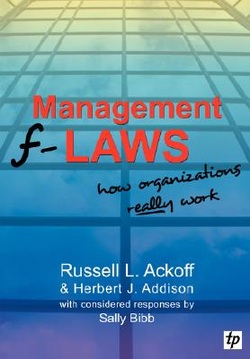Management f-LAWS - Sample f-Law
Russell Ackoff's f-LAW number 36:
The less important an issue is, the more time managers spend discussing it. Commentary by Russell Ackoff and Herbert Addison: More time is spent on small talk than is spent on large talk. Most talk is about what matters least. What matters least is what most of us know most about. The more something matters, the less we know about it. Everyone is an expert on trivia. So everyone can discuss trivialities with equal authority and at great length. This is not true with important issues on which there are alleged experts. Experts, those who know a great deal about a subject, tend to limit discussion to what they know about it. Their authority is vulnerable to new ideas, which, of course, seldom come from other experts, but from non-experts whom experts try to exclude from the discussion. Experts seldom accept any responsibility for errors resulting from following their advice. However, they accept full responsibility for any successes that result from following their advice, however remote the connection. Response by Sally Bibb: This is a serious malaise. Managers feel comfortable discussing trivial issues because there's less at stake. Important issues cause trouble because discussions about them can lead to people taking difficult decisions. Difficult issues don't usually need experts to solve them. They need willing people to try to understand, evaluate, make a decision and then do something. This is risky. The more difficult the issue the more likely it is that there isn't one right answer. Managers prefer it when there is only one right answer because it lessens the risk of making a mistake. Difficult issues are often also problems whose solution is a journey not a destination. You can start solving the problem only to find that it's not working out as you wanted. Then you need to change course. Many managers would rather die than change course. Sometimes there can be overwhelming evidence that the original decision wasn't the best one and that something else needs doing. Some managers see that as having to admit that they were wrong, which they were. They see something wrong in admitting they were wrong. In fact, it's a valuable thing to do. In the best organisations, people have no qualms about changing course or admitting mistakes. Their aim is to resolve an issue. When Edison invented the light bulb it took thousands of attempts. He saw each one as increasing his understanding of what didn't work. He didn't see them as failures. |
|

